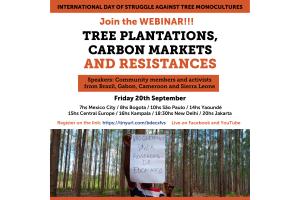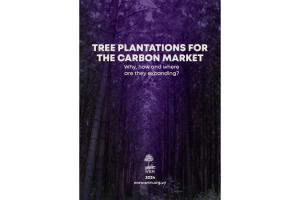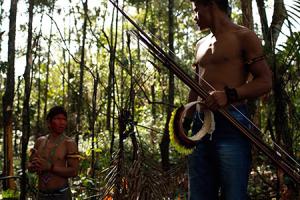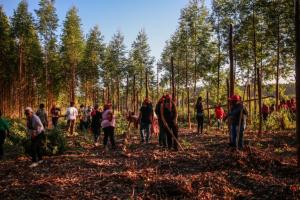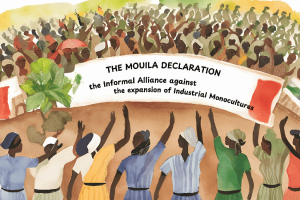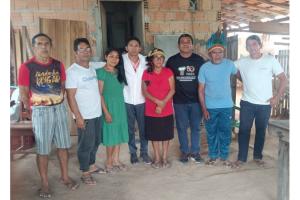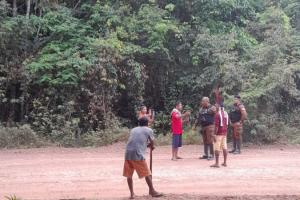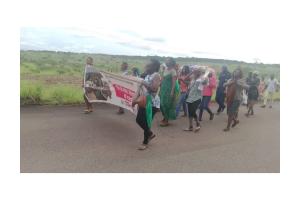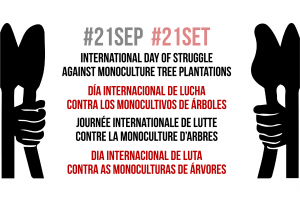Struggles Against Tree Monocultures
Corporate profit drives land grabs to install industrial tree monocultures. Where industrial plantations take root, communities' territories and lives are violently invaded, their forests destroyed and their water polluted. When communities resist, companies tend to respond with aggression. Despite this extreme violence, communities around the world are resisting, organizing and joining forces to defend their territories. Every September 21 the International Day of Struggle against Monoculture Tree Plantations is celebrated.
Articles
13 September 2024
On the eve of the International Day of Struggle against Tree Monocultures, we invite you to participate in the webinar “Tree Plantations, Carbon Markets and Resistances”. It will be on Friday 20th September.
Publications
10 September 2024
This briefing provides an overview of the expansion of tree plantations aimed at carbon markets. Where are these plantations located, who is profiting from them, what have been the impacts for communities living on the lands these projects occupy, and what international initiatives are taking place to boost tree plantations for carbon offsetting.
Bulletin articles
4 January 2022
We invite you to reflect with an activist who explores resistance processes and the challenges they face, based on her experience with struggles in Brazil. In this reflection, we also invite you to join the collective resistance from your own contexts and spaces of organization. The fight continues and the fight is one!
Articles
13 March 2025
WRM expresses its solidarity with the struggle of women from the Rural Landless Workers' Movement (MST) in Brazil. On this day, March 13, they are taking various actions across the country in favor of agrarian reform and against the multiple forms of violence perpetrated against women, under the slogan “Agribusiness means violence and environmental crimes. The struggle of women is against capital”. One of the actions is taking place in the state of Espírito Santo, where 1000 women have occupied an area belonging to Suzano.
Bulletin articles
15 December 2024
The just-released “Mouila Declaration” is a message of resistance, solidarity and unity from communities and grassroots organisations of the Informal Alliance against the expansion of Industrial Monocultures.
Other information
15 December 2024
Articles
1 November 2024
In the upper Acará River in Pará, in the Brazilian Amazon, Turiwara indigenous people are defending their territory against the oil palm monoculture company Agropalma, that invaded the lands. The Turiwara fear for their lives due to the presence of company guards and other heavily armed people, frightening them.
Bulletin articles
24 October 2024
The company Sequoia has obtained a lease over 60,000 hectares for a eucalyptus monoculture project in the Haut-Ogooué province, Gabon. Meanwhile, statements from communities and a survey of more than 1,400 people from the impacted region reveal a total rejection of this plantation project. Additionally, Gabonese government and parliamentary authorities have openly expressed an unfavorable position on the project.
Bulletin articles
24 October 2024
Besides the direct impacts on communities’ lives, eucalyptus monoculture plantations represent absurd and obscene inequality. A group of 45 community people with whom we spoke was shocked to learn that it would take them 2,300 years of non-stop work to collectively earn the same amount that a single Portuguese family, one of the owners of the plantation company they work for, earned in one single year from the profits of their shares in the company.
Articles
21 September 2024
21 September, the International Day of Struggle Against Monoculture Tree Plantations, is a day for organizations, networks and movements to celebrate the resistance against industrial tree plantations.
Action alerts
5 September 2024
National and international organizations sent an letter to Brazilian authorities to demand urgent protection for the Turiwara indigenous people of the upper Acará River, in Pará, who are suffering violence and serious threats from Agropalma company.
Action alerts
23 August 2024
